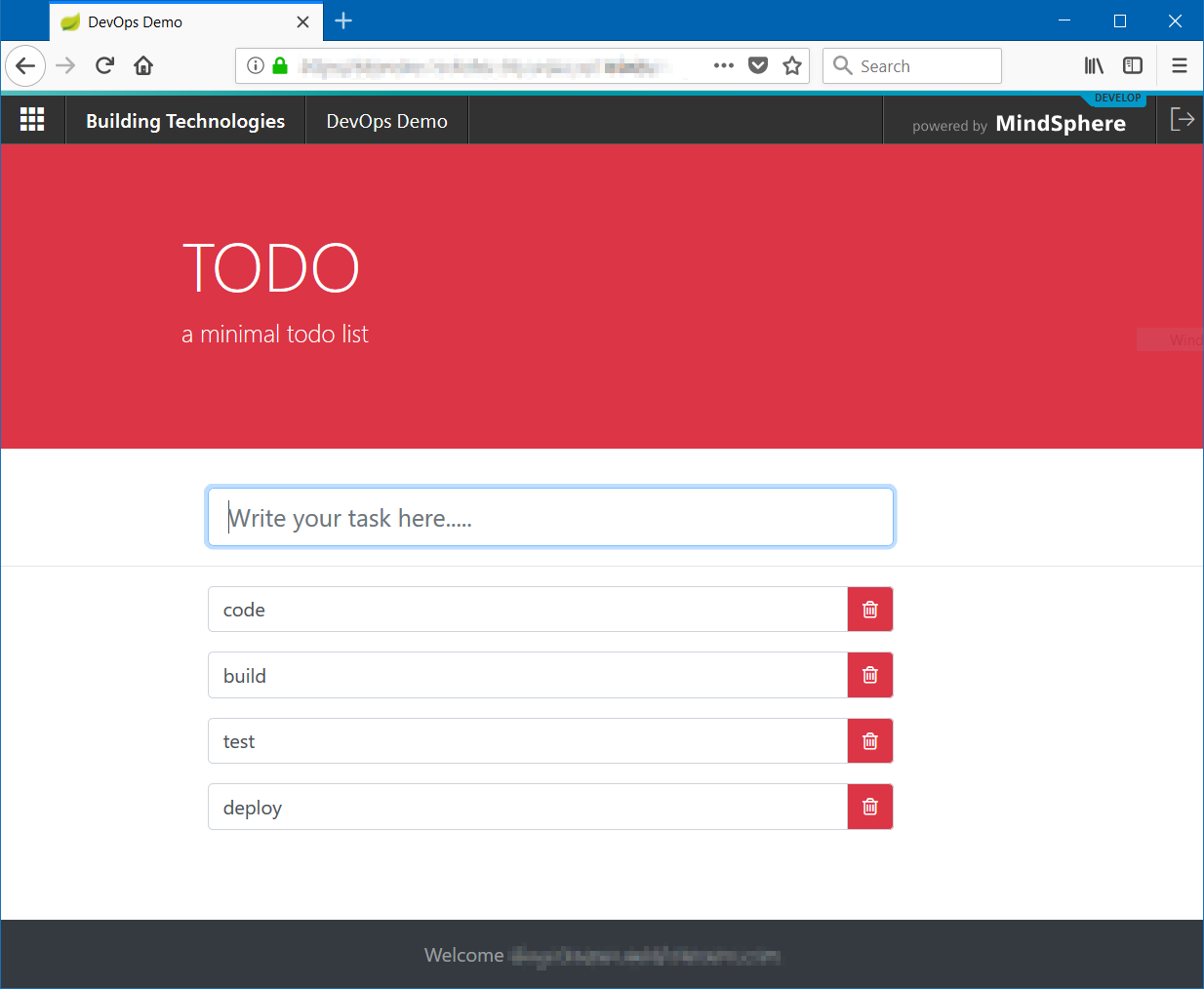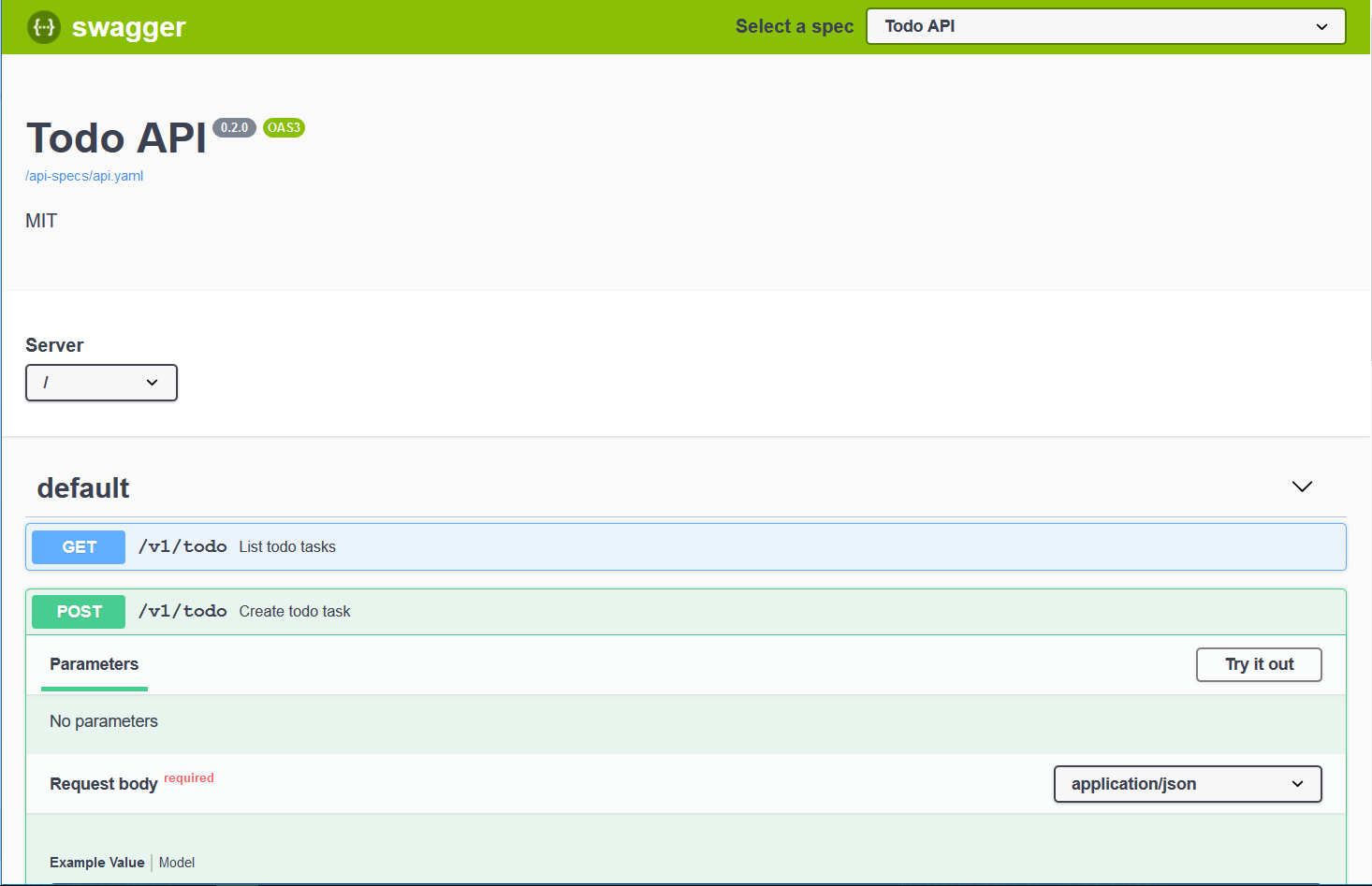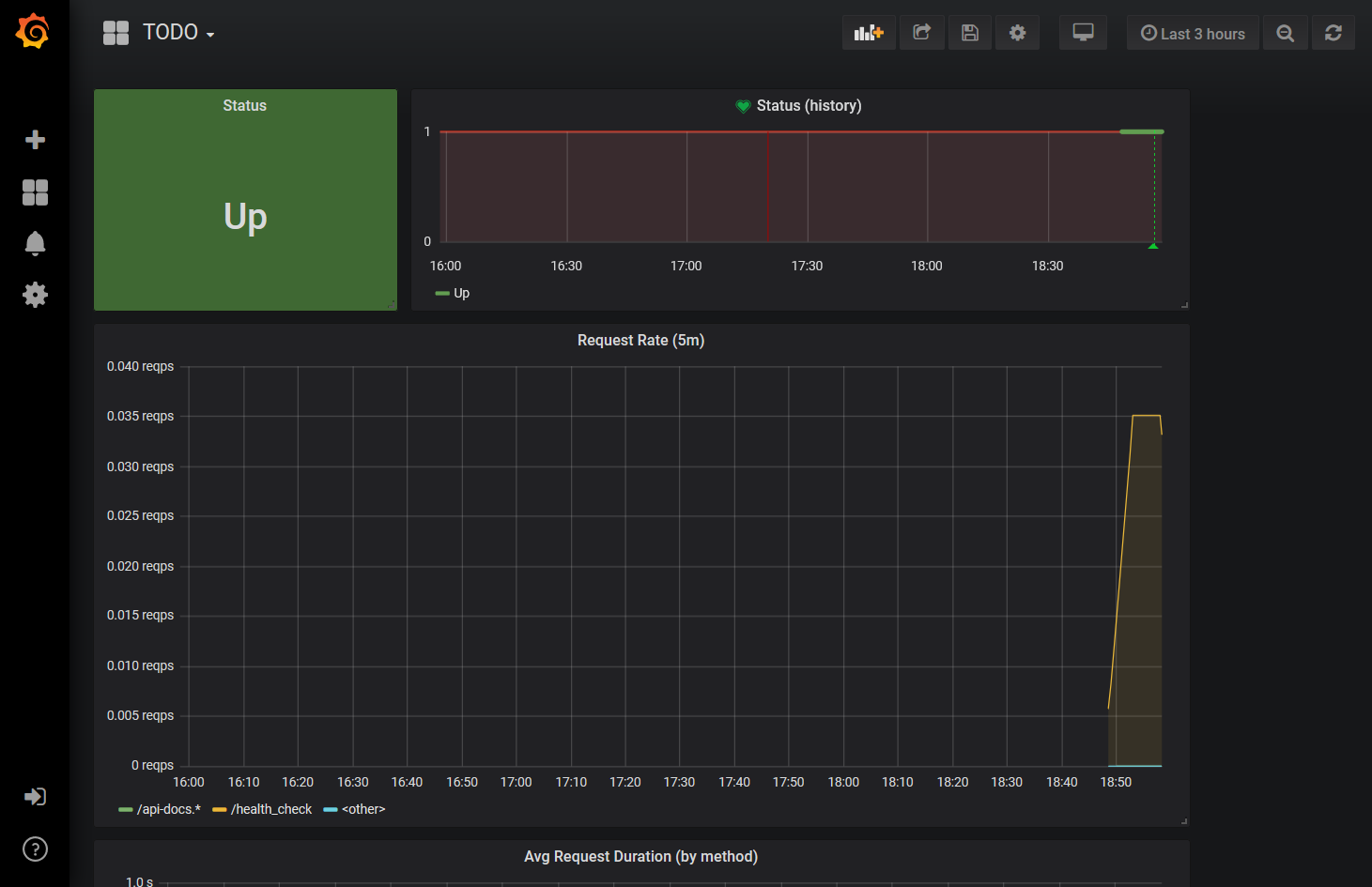Close interaction of development and operations is essential to accelerate delivery of applications. This is a demo across the whole DevOps cycle with MindSphere, by using well known and widely used open source tools.
High level architecture diagram (draw.io png with embedded xml):
The demo consists of:
- a simple todo app using the MEAN (MongoDB, Express.js, Angular, Node.js) stack
- Angular App (root folder)
- Backend
- the backend provides swagger-ui for navigating both the server apis and
the MindSphere APIs (under
/api-docs)
- the backend provides swagger-ui for navigating both the server apis and
the MindSphere APIs (under
- local Angular dev server setup that proxies requests to MindSphere, allowing local development
- a devops admin backend that provides access to prometheus and grafana
- a sample agent that can be used to simulate an actual device sending IoT data to the MindSphere APIs
Additionally, tooling to ease ssh connectivity to running cf applications is provided.
Please refer to the official MindSphere & CloudFoundry developer documentation for detailed information about the platform:
The todo app provides examples on CI/CD including unit and e2e tests.
The following environment variables are recognized by the todo backend:
| Variable | Description | Required | Default |
|---|---|---|---|
MDSP_TENANT |
MindSphere tenant identifier | only on MindSphere deploy | empty |
MDSP_REGION |
MindSphere region identifier | only on MindSphere deploy | empty |
This project includes support for running the web interface in local development mode connected to MindSphere. In order to reach the MindSphere APIs you need to provide user credentials for your user.
The local Angular development server is setup to use a local proxy based on WebPack that forwards api requests:
/api/**will be forwarded tohttps://gateway.<MDSP_REGION>.mindsphere.io
This applies to all MindSphere API calls. You can check the MindSphere service source for a sample./v1/**will be forwarded tohttp://localhost:3000
This applies to all local Node.js todo backend server API calls. You can start the backend locally from theserver/directory.
To be able to reach the MindSphere APIs from your local environment you need
to setup authentication credentials for the MindSphere /api/** endpoints.
Please note the next steps are only needed if you call directly MindSphere
APIs from your frontend. They are not needed to interact with the local
todo API backend.
- As a first one-time step you need to register your application in the
MindSphere Developer Cockpit by following the official documentation
- Create the application
- Register endpoints (a single
/**is enough for this app) - IMPORTANT Configure the application Roles & Scopes
Your application will only have access to the MindSphere APIs that are
configured in this step. Also assign the core role
mdsp:core:tm.tenantUseror the MindSphere OS Bar won't be able to show the tenant information - Register the application
- Assign the application scopes to the users that should have access (in the tenant Settings app)
- Access your new application with a web browser and authenticate. On
successful authentication the MindSphere gateway will setup some session
cookies. Use the browser developer tools to copy the cookies
SESSIONandXSRF-TOKEN - Create a file
src/environments/.environment.mdsplocal.ts(notice the dot in the name) with the same contents assrc/environments/environment.ts. This file will be ignored by git - In this file set the variables
xsrfTokenHeaderandsessionCookieto the values copied before - These credentials will be valid for a maximum of 12 hours and have an inactivity timeout of 30 minutes. When they expire, you can execute the same flow again by logging in to MindSphere
Then start the local todo backend and Angular dev server. You will be able to enjoy live reload of changes done in the source code of the Angular app:
# Start mongodb server
docker run -p 27017:27017 mongo
# Start nodejs backend
yarn --cwd server
yarn --cwd server start
# Start Angular dev server
yarn
yarn startNow load http://localhost:4200
You can also reach the API navigator under http://localhost:3000/api-docs
We provide a manifest file to be used for deployment to MindSphere:
- The manifest uses
random-route: true, this will create the application with a random internal route to ensure no naming conflicts with other apps in the same space (e.g.todo-funny-chipmunk.apps.eu1.mindsphere) - Please note that if you intend later to deploy devopsadmin, Grafana and Prometheus, you'll need to set in their configuration the appropriate internal random name assigned by the route directive
- Take a look at the
.gitlab-ci.ymlfile for an example of an actual deployment performed by our CI pipeline
Use cf login to connect via cli and make sure you can interact with the
MindSphere CloudFoundry backend. Follow the
MindSphere developer documentation.
Before deploying, ensure that the appropriate cloudfoundry services are available:
-
The mongodb service is required. You can choose whichever name you please, the app will auto-discover it on startup:
cf create-service mongodb32 mongodb-xs todo-mongodb
-
Create the LogMe (ELK) service for log aggregation. This is not a requirement and you could remove it from the manifest definition The same service can be used to aggregate any number of app logs. The MindSphere platform will automatically gather the logs after binding:
cf create-service logme logme-xs todo-logme
Build & push the todo app, set authentication environment variables, and bind the services:
# Build static angular app into the server/ directory
yarn
yarn build:prod --no-progress
# Push nodejs server
yarn --cwd server
cf push --var mdspTenant="${MDSP_TENANT}" --var mdspRegion="${MDSP_REGION}"(Only once) in the MindSphere Developer Cockpit, some CSP policy adaptations
are needed on the default-src directive:
- allow connections to the OpenAPI specs hosted on
developer.mindsphere.io - allow connections to the piam endpoint of the gateway; this is required for login redirects when the user session token expires
Example (substitute <your-tenant> and <your-region> accordingly):
default-src 'self' <your-tenant>.piam.<your-region>.mindsphere.io developer.mindsphere.io static.<your-region>.mindsphere.io;
More information under: https://developer.mindsphere.io/concepts/concept-csp.html
Run ng serve for a dev server. Navigate to http://localhost:4200/. The app
will automatically reload if you change any of the source files.
- Run the todo api server available on the
server/directory. This will start the api server onhttp://localhost:3000 - Run
yarn start. Navigate tohttp://localhost:4200/. The app will proxy api calls tohttp://localhost:3000and automatically reload if you change any of the source files
Run ng generate component component-name to generate a new component. You can
also use ng generate directive|pipe|service|class|guard|interface|enum|module.
Run ng build to build the project. The build artifacts will be stored in the
dist/ directory. Use the --prod flag for a production build.
Run ng test to execute the unit tests via Karma.
Run ng e2e to execute the end-to-end tests via Protractor.
To get more help on the Angular CLI use ng help or go check out the
Angular CLI README.
- The gitlab-ci integration requires manually setting
authentication with access and refresh tokens available as protected
CI/CD Gitlab Variables,
and they need to be renewed every 30 days. This can be copied directly from
your CloudFoundry CLI
~/.cf/config.jsonfile after successfulcf login. - Storage for Prometheus is currently transient, pending support for some kind of dynamic persistent storage for apps, or direct support for Prometheus in MindSphere.
- Prometheus metrics http endpoints are read-only but not protected.
This project is licensed under the MIT License



